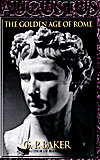 Cooper Square Press, 2000, $18.95, ISBN 0-8154-1089-1, 324 pages
Cooper Square Press, 2000, $18.95, ISBN 0-8154-1089-1, 324 pages
This reprint of the 1937 edition reads pretty well after 63 years, and although scholars may have added archaeological evidence since then, the portrait of the first Roman Emperor--with apologies to Julius Caesar--remains an excellent source of information. Baker weaves a sympathetic portrait of this teenager thrust into the limelight after the assassination of Julius. How Octavian plays the political game makes for an incredible story and Baker tells it well.
Baker also outlines the reasoning behind the events, detailing the options and outcomes of political maneuverings and social reconstruction in the wake of becoming heir to Julius and emperor in his own right.
"The new attitude..., which Augustus helped to make fashionable where his influence penetrated...Not to worry, nor to attribute importance to trifles, to have faith in good sense, and to hold ourselves quiet; to follow our own genius and to enjoy what we really like best-and to accept the consequences, concerning which we most of us have shrewder ideas than we are willing to admit-this was the new attitude; perhaps a little puzzling at first until we have grasped its implications...To avoid extremes and take the middle road was the whole theory on which Augustus had worked." (page 277)
Battles and campaigns receive adequate coverage for a one-volume biography. Certainly the battle of Philippi is explained, as is the siege of Perusia, and the running campaign against Sextius Pompeius. But while important, the focus remains on Augustus' efforts to bring peace and usher in a golden age. How ironic that a man who began with a civil war against the aristocrats who had killed Julius, followed by an even larger civil war against Mark Anthony, as well as continual skirmishes and campaigns against external enemies, would also be known for his improved administration, revamped constitution, and transition from civil war to civil peace.
Late in life, he remarked that he had found Rome a city of bricks and left it a city of marble. Baker's ode to Augustus is a favorable one.
Back to List of Book Reviews: Ancients
Back to Master Book Review List
Back to Master Magazine List
© Copyright 2001 by Coalition Web, Inc.
This article appears in MagWeb (Magazine Web) on the Internet World Wide Web.
Other military history articles and gaming articles are available at http://www.magweb.com